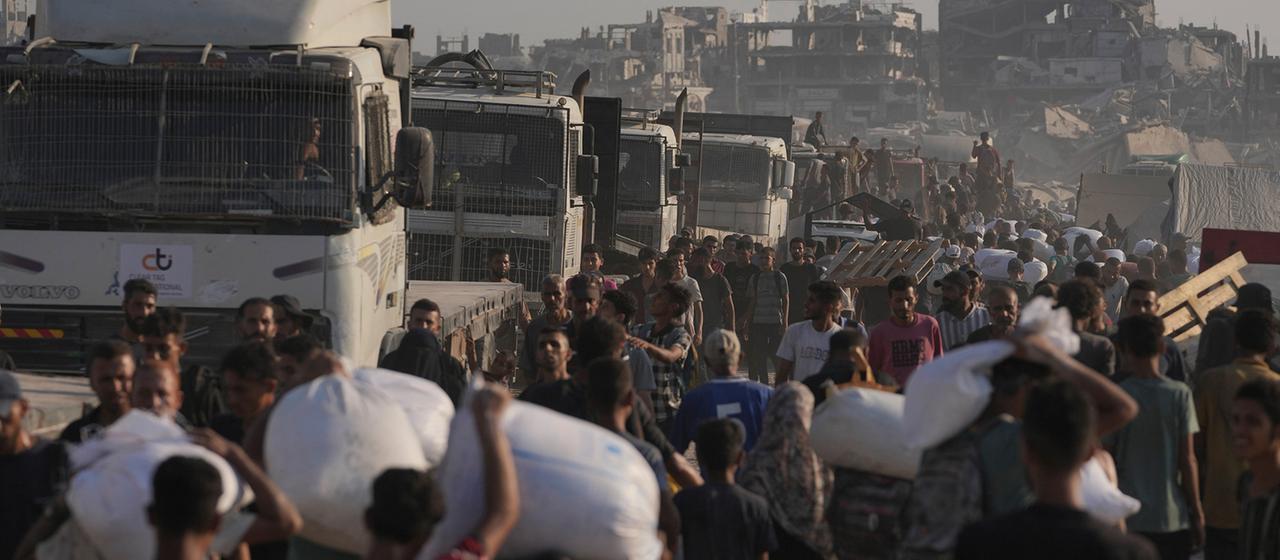
Pressure on Israel had increased due to the catastrophic humanitarian situation: Now, aid is once again arriving in the Gaza Strip by air and land. The army announced a ceasefire until further notice.
After months of a de facto blockade by Israel, large-scale aid shipments have reached the Gaza Strip for the first time. Today, about 100 trucks carrying food passed through the Israeli-controlled Kerem Shalom border crossing, sources there told the dpa news agency.
Egyptian television and the news agency had previously reported that the first trucks had entered the Gaza Strip from Egypt at the Rafah border crossing. However, trucks cannot enter the Palestinian Territories directly from there, but must make a detour of several kilometers via Kerem Shalom, where they are inspected.
Airdrop of relief supplies has begun
The goods on the trucks—food, medicine, baby formula—are urgently needed. The World Health Organization (WHO) recently warned of a deadly hunger crisis among the approximately two million residents of the Gaza Strip. Photos from the sealed-off territory, where Israel is waging war against the Islamist Hamas, showed infants in hospitals who were nothing but skin and bones. According to the Health Ministry, controlled by the Islamist Hamas, more than 100 people have already died of malnutrition, 80 percent of them children.
According to a military spokesperson, Israel has also resumed airdrops of aid. They reportedly include seven pallets of flour, sugar, and canned food. Palestinian sources confirmed to the Reuters news agency that airdrops of aid have begun in the northern Gaza Strip.
"Tactical breaks" and corridors
The Israeli army had previously announced "tactical pauses" in its operations in the Gaza Strip for humanitarian purposes. The army announced that, starting today, it would observe a"tactical pause in military activities for humanitarian purposes" from 10:00 a.m. to 8:00 p.m. local time"every day until further notice." The pause would apply to the areas where the army is not operating: Al-Mawasi in the southwest of the coastal strip, Deir al-Balah in the center, and Gaza City in the north. This was coordinated with the UN and international organizations.
Corridors will also be set up between 6:00 a.m. and 11:00 p.m. local time to allow the safe passage of aid convoys.
Israel had previously designated the tent city in Al-Mawasi as a safe haven for civilians. However, Israeli attacks have also occurred there, resulting in many deaths. Deir al-Balah is home to the World Health Organization's (WHO) central warehouse for the Gaza Strip. According to the WHO, it was recently damaged when the military first moved in with ground troops.
The military also announced that a drinking water treatment plant had been reconnected to the Israeli power grid, enabling a daily water production of 20,000 cubic meters.
Deaths in Israeli attacks
Despite the humanitarian ceasefire in parts of the Gaza Strip, Israel continued its attacks. Tents housing displaced people near Deir al-Balah were also reportedly hit, according to rescue workers. According to the Hamas-controlled health authority, at least 53 Palestinians have been killed since dawn.
This number, which cannot be independently verified, does not distinguish between civilians and combatants. Thirty-two people alone are said to have been killed while waiting for humanitarian aid. Fatal incidents repeatedly occur, particularly in the vicinity of the distribution centers of the Gaza Humanitarian Foundation (GHF), which is supported by Israel and the US.
Since imposing the de facto blockade, Israel has had the majority of the few goods that have reached the Gaza Strip distributed through the GHF. There, the distribution of food packages—which experts criticized as improper—frequently led to chaotic scenes. Israeli soldiers assigned to secure the perimeter repeatedly fired shots. According to UN figures, around 900 people are said to have died as a result.
Aid by air is considered ineffective
The latest aid deliveries have been criticized. Aid workers consider air transport the most expensive and ineffective form of humanitarian aid—partly because it usually involves relatively small quantities. Around two million Palestinians live in the Gaza Strip, most of whom are in urgent need of aid.
Mohammed Suheib, one of hundreds of thousands of displaced people in the Gaza Strip, does not see airdrops of aid as a solution to the supply problems in the war zone. He said:"When aid is dropped from the air, it often causes injury and damage, and massacres occur in the streets. We should receive aid through legitimate channels, from an aid organization, an NGO, UNRWA. If one, two, or ten pallets are dropped, all those people won't be able to take it. Only one or two percent of the people will receive the aid."
Growing pressure on Israel
Israel has come under increasing pressure in recent days due to the devastating humanitarian situation in the Gaza Strip. More than 100 aid organizations, including Doctors Without Borders, Save the Children, and Oxfam, have warned of"mass starvation" in the Palestinian territory. The World Health Organization has also warned of a deadly hunger crisis in the Gaza Strip.
The organizations called for immediate negotiations on a ceasefire, the opening of all border crossings and the unhindered flow of humanitarian aid through UN-controlled structures.
The Israeli army maintains that there is no famine in Gaza."The Israeli forces emphasize that there is no famine in Gaza; this is a false Hamas campaign," the army said in a post on X. The military provided no evidence for this statement.
The Israeli government accuses Hamas of obstructing the distribution of aid in the Gaza Strip, looting humanitarian supplies, and selling food at inflated prices. Hamas, in turn, accuses the Israeli army of regularly shooting at aid seekers near distribution centers. Israel denies these allegations.

